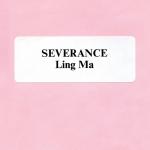A Novel Tackles Capitalism and Boredom

Severance, a radically understated debut novel from Ling Ma, is about a zombie apocalypse. It is also about the soul-sucking nature of life under capitalism. In neither case is it joking.
Severance
Ling Ma
Farrar, Strauss and Giroux; 304 pages
Hardback: $26.00
August 14, 2018
ISBN: 9780374261597
Severance revolves around a woman named Candace, who immigrated to the US from Fuzhou in China when she was 6 years old; as the novel opens, she is working at an art publisher, managing Bible production. In alternating chapters, Candace tells us the story of the world circa 2011, when she spends her days grinding her way through her dull job in New York — and the world a few months later, after the arrival of a plague known as Shen Fever. In that later timeline, Candace is part of a small sect of survivors trying to scrounge a survival out of what’s left of a Midwest ridden with plague.
The apocalypse created by Shen Fever is only loosely a zombie apocalypse. Candace describes it as “a fever of repetition, of routine,” and its victims find themselves going through the motions of their daily lives, now emptied of meaning, again and again and again: A mother sets the table for her family and then resets it, a little girl pages through her favorite book while she holds it upside down, a young woman tries on all of her clothes. As the fever grips them, the afflicted lose the ability to do anything but recreate their old patterns, and so they slowly starve to death and rot from within.
But as Ma’s dispassionate prose makes clear, the life of a Shen Fever victim is not significantly different from the life of an office drone. Candace is an aspiring artist who does not particularly want to work in Bible production, and who is a little grossed out by the way it forces her to push for lower wages and poorer working conditions in the Chinese factories where her Bibles are made, but she makes her way through her empty, meaningless routine nonetheless.
Meanwhile, Candace’s post-apocalyptic life bears an uncomfortable resemblance to her professional life. The group of survivors she joins gradually develops cult-like attributes — members have to participate in regular prayers and obey arbitrary rules, and those who disobey are punished harshly — but the leader is less a charismatic Charles Manson and more a petty middle manager. He used to be an IT guy. His name is Bob.
“How do you like it here so far, being with us, I mean? Do you think we’re the right fit for you?” Bob asks Candace after she’s been in the group for a few days. “I’d like you to be more participatory, if possible,” he says.
The fact that Bob is amusingly pathetic doesn’t stop him from making Candace’s life hell — and the fact that her pre-apocalypse job is low-stakes and boring doesn’t stop that boss from making Candace’s life hell either. In the sect, she has to lead group prayer and gets locked up in an empty L’Occitane store when she breaks the rules; at work, she has nightmares about thin Bible paper ripping on the presses.
Ma’s critique of capitalism is not particularly subtle or particularly original, but it is searingly underplayed. Candace’s affect is as dry as the Sahara; you feel exactly how worn down she has become by the system under which she lives.
Ma’s critique is also intersectional. She is thoughtful about how the capitalism of the West oppresses the factory workers of the East; in one passage, Candace has to find a cheap supplier of faux gemstones for a Bible, even though she has explained to her client that making the gems quickly creates a gritty, dust-laden air that will kill the workers who produce them. That the Shen Fever originates in China feels grimly ironic: It’s one last “made in China” for the end of the world.
Throughout, Severance operates with severe restraint. Candace is a closed-off character who rarely feels much beyond a kind of soul-crushing ennui, and her voice is relentlessly understated. But there’s a power to the restraint, and an elegance to the understatement: It grinds you down slowly, the way riding the New York City subway does, so that you’ve barely noticed that you’re in the middle of something terrible before you’re used to it. It’s apocalypse by commute. And in that banality, there is enormous force.
[Essayist Constance Grady is a staff writer at Vox. She proclaims no relation to the Ugly Betty character of the same name.]
